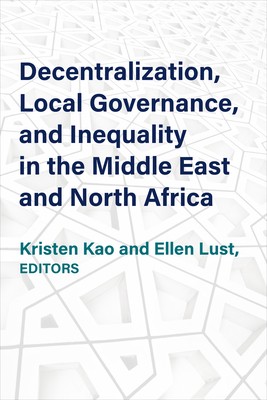
- We will send in 10–14 business days.
- Publisher: University of Michigan Press
- ISBN-10: 0472057138
- ISBN-13: 9780472057139
- Format: 15.7 x 22.7 x 2.1 cm, minkšti viršeliai
- Language: English
- SAVE -10% with code: EXTRA
Decentralization, Local Governance, and Inequality in the Middle East and North Africa (e-book) (used book) | bookbook.eu
Reviews
Description
While many scholars, policymakers, and development practitioners view decentralization as a way to increase participation, strengthen political representation, and improve social welfare, little is known about the experiences of communities in the context of decentralization - particularly in the Middle East and North Africa. This volume directs our attention toward the ways in which decentralization is "lived locally" by citizens of the MENA region, underscoring the simultaneous influences of individual-level factors (e.g., gender, education) and local context (e.g., development levels, electoral institutions) on governance processes and outcomes.
A group of international scholars brings together methodologically diverse, original research in Lebanon, Morocco, Syria, and Tunisia to expand the literature on decentralization. Following a preface by Moulay Hicham, the empirical chapters are arranged into three thematic sections focused on subnational variations in the relationships between central and local actors, citizen engagement with state and non-state institutions, and the extent to which representatives reflect their local communities. Together, these chapters provide important insights into governance, participation, and representation in the MENA and open new questions for furthering the study of governance and local development. Only by unpacking perspectives and governance experiences at the micro-level can we understand how decentralization policies affect citizens' everyday lives.EXTRA 10 % discount with code: EXTRA
The promotion ends in 22d.01:13:39
The discount code is valid when purchasing from 10 €. Discounts do not stack.
- Publisher: University of Michigan Press
- ISBN-10: 0472057138
- ISBN-13: 9780472057139
- Format: 15.7 x 22.7 x 2.1 cm, minkšti viršeliai
- Language: English English
While many scholars, policymakers, and development practitioners view decentralization as a way to increase participation, strengthen political representation, and improve social welfare, little is known about the experiences of communities in the context of decentralization - particularly in the Middle East and North Africa. This volume directs our attention toward the ways in which decentralization is "lived locally" by citizens of the MENA region, underscoring the simultaneous influences of individual-level factors (e.g., gender, education) and local context (e.g., development levels, electoral institutions) on governance processes and outcomes.
A group of international scholars brings together methodologically diverse, original research in Lebanon, Morocco, Syria, and Tunisia to expand the literature on decentralization. Following a preface by Moulay Hicham, the empirical chapters are arranged into three thematic sections focused on subnational variations in the relationships between central and local actors, citizen engagement with state and non-state institutions, and the extent to which representatives reflect their local communities. Together, these chapters provide important insights into governance, participation, and representation in the MENA and open new questions for furthering the study of governance and local development. Only by unpacking perspectives and governance experiences at the micro-level can we understand how decentralization policies affect citizens' everyday lives.

Reviews